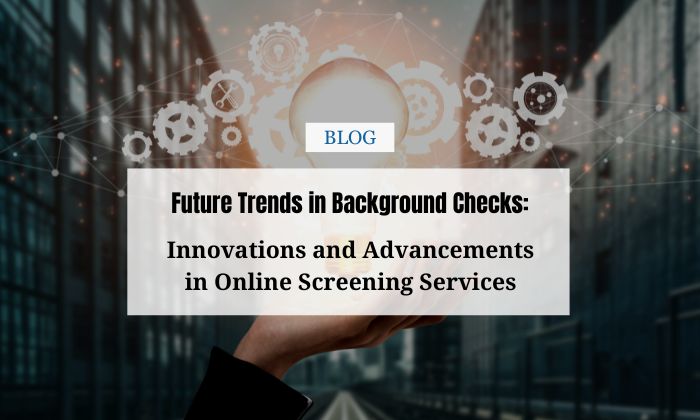Ensuring compliance with healthcare background checks is vital during the hiring process. The individuals you bring on board in healthcare environments significantly impact the well-being of patients, staff, and visitors.
By grasping the importance of healthcare background checks, you can establish and uphold a background check system that enables you to recruit competent and reliable individuals, thereby reducing potential risks and liabilities.
Why Background Screening Matters in Healthcare
Investigating individuals’ backgrounds is crucial for identifying any potential criminal history, substance misuse, or misconduct that could pose risks to your institution.
By conducting thorough background checks, healthcare establishments can delve into candidates’ professional and personal backgrounds, empowering the talent acquisition team to make well-informed hiring decisions. The objective is to recruit individuals who are not only qualified but also vetted thoroughly.
Given the stringent regulations in the healthcare sector, it’s imperative to ensure that employees possess the necessary licenses, credentials, and vaccinations pertinent to their roles. Moreover, the criteria for due diligence may vary based on the nature of care provided, the role held, and the state regulations. Engaging a comprehensive background screening provider can assist in verifying these aspects, furnishing you with the essential background details to facilitate prudent decision-making.
Compliance Standards for Background Checks in the Healthcare Sector
The requirements for conducting background checks on healthcare professionals can vary significantly depending on location and the specific type of care provided. It’s essential to stay informed and ensure compliance with both state and federal laws.
State and Local Regulations
Healthcare organizations must adhere to a range of state and local laws when conducting background checks on potential employees. It’s crucial to familiarize yourself with the specific requirements of the state or states in which your organization operates.
In general, these laws may mandate background checks for all employees and volunteers who have direct contact with patients, vulnerable populations, or access to confidential patient information. This typically encompasses medical personnel, nursing staff, administrators, and sometimes even students and volunteers, as defined by state law. Requirements can include criminal background checks, verification of educational credentials and professional licensing, checking abuse registries, and examining sex offender registries. Certain offenses or results may render individuals ineligible for employment in these roles, as defined by state statutes.
For instance, Illinois’ Health Care Worker Background Check Act prohibits healthcare institutions from employing individuals with specific criminal convictions or a history of physical, sexual, or child abuse. Some states also require employers to maintain rosters of employees subject to these standards and report any changes.
Federal Agency Regulations
The Office of the Inspector General (OIG) oversees Medicare and Medicaid programs, aiming to combat waste, fraud, and abuse. Healthcare providers receiving federal funding through these programs must adhere to the OIG’s background check rules. The OIG maintains a List of Excluded Individuals/Entities (LEIE) consisting of those found guilty of certain criminal offenses. Hiring individuals or entities from this exclusion list can jeopardize participation in federal programs, potentially resulting in civil monetary penalties.
The Joint Commission, a nonprofit accrediting body, also plays a significant role in healthcare regulation. Recognized by the Centers for Medicare and Medicaid Services (CMS), Joint Commission accreditation signifies compliance with acceptable standards. In addition to state regulations, compliance with the Joint Commission’s background check requirements may be necessary for accreditation.
Furthermore, employers must ensure compliance with the Fair Credit Reporting Act (FCRA), which safeguards applicants and employees during the background screening process. Adverse actions taken based on background reports require employers to provide applicants with a copy of the report for review or dispute.
Choosing a background check partner accredited by the Professional Background Screening Association (PBSA) provides assurance of understanding FCRA obligations and related responsibilities.
Understanding Healthcare Background Check Requirements: Who Needs to Comply?
In the realm of healthcare, different positions may warrant varying degrees of background scrutiny. Let’s delve into the distinct categories of personnel within your healthcare institution and the corresponding background checks applicable to each:
Healthcare Employees
Those directly involved in patient care typically fall under background check mandates, as outlined by state regulations. This group encompasses physicians, nurses, and allied health professionals. When hiring healthcare employees, standard procedures often include criminal history checks, national sex offender registry searches, and validation of education, licensure, and immunization records.
Special emphasis is placed on employees in long-term care (LTC) facilities due to historical incidents of patient abuse, neglect, and financial impropriety, prompting heightened background screening protocols endorsed by the Centers for Medicare & Medicaid Services (CMS).
Physicians and Other Medical Staff
Beyond the baseline requirements for healthcare employees, physicians and medical staff, such as nurse practitioners and registered nurses, face ongoing scrutiny. This includes maintaining continuing education credits to uphold credentials and adhering to regular monitoring protocols to ensure compliance with exclusion lists maintained by the Office of the Inspector General (OIG).
Specialized tools like PractitionerCheck® aid in maintaining regulatory compliance, while products such as SanctionCheck and LicenseManager Pro offer continuous monitoring to mitigate risks associated with exclusions, disciplinary actions, and licensure changes.
Nursing and Allied Health Students
Students engaged in clinical rotations are subject to similar scrutiny as employees, given their direct interaction with patients. Streamlining this process is facilitated by tools like StudentCheck® to expedite student placement.
Key Background Checks for Healthcare Organizations
Criminal Background Checks
Conducting thorough criminal background checks helps healthcare institutions avoid unwittingly hiring individuals with problematic histories. Identifying such individuals enables informed decisions to maintain a safe working environment and mitigate potential legal or financial liabilities.
Drug Screenings
Screening for substance use ensures that healthcare staff operate without impairment, safeguarding the quality of patient care and upholding the organization’s reputation. This practice also contributes to employer branding and patient attraction.
Identity Verification Checks
Validating employee identities safeguards sensitive information and reduces the risk of identity theft or HIPAA violations. By ensuring the integrity of care providers, healthcare organizations foster patient trust and satisfaction.
Healthcare Sanction Checks
Verifying employees’ compliance with OIG guidelines prevents the hiring of individuals with records of fraud or abuse, bolstering patient safety and regulatory adherence.
Immunization Records
Tracking immunizations among healthcare workers safeguards against communicable diseases, promoting safer patient care and evidencing compliance with relevant regulations.
By comprehensively addressing background check requirements across various roles and screening types, healthcare organizations prioritize patient safety, regulatory compliance, and organizational integrity.
4 Tips for Managing Healthcare Background Screening Programs
In the realm of healthcare, ensuring compliance with background screening protocols is paramount. Here’s a comprehensive guide to maintaining a consistent, secure, and reliable screening process:
- Establishing a Consistent Process: Begin by crafting a written policy outlining the requisite background checks for new hires, encompassing criminal history and credential verification. Implement periodic reviews for existing employees to uphold up-to-date background information.
Standardize the application form for prospective hires, incorporating inquiries regarding past employment and education. Employ structured fields to ensure uniform completion and swift verification. Collaborate with reputable third-party screening services to conduct unbiased and high-quality screenings, while ensuring secure storage of obtained information.
Develop a clear protocol for addressing potential issues arising from background checks, facilitating additional interviews or investigations as necessary.
- Defining Criteria for Hiring Decisions: Document role-specific criteria that trigger automatic disqualification, such as specific criminal convictions or inclusion on the OIG’s exclusion list.
Critical factors for hiring decisions include verification of licenses and certifications, educational background, drug screenings, and criminal history checks. Establishing these criteria enables informed and compliant hiring practices, safeguarding patient care standards and mitigating institutional risks.
- Maintaining Security and Confidentiality: Preserving the security and confidentiality of background screening reports is imperative to protect applicant and employee data and mitigate legal liabilities.
Utilize secure digital storage systems and encryption protocols, adhering to cybersecurity best practices. Limit access to authorized personnel, enforcing stringent authentication measures.
Implement cybersecurity and privacy policies extending to third-party vendors and contractors, ensuring adherence to data protection standards. Regularly audit security protocols to adapt to evolving threats.
- Finding a Trusted Background Check Partner: Prioritize research when selecting a healthcare background screening provider. Opt for specialists well-versed in healthcare regulations and equipped with updated technologies.
Consider providers accredited by the Professional Background Screening Association (PBSA) to ensure compliance with industry standards. Evaluate reputations within the industry and familiarity with local laws.
Choose a provider offering comprehensive background checks for all healthcare personnel levels, tailored to meet specific institutional requirements.
By adhering to these guidelines and partnering with reputable screening providers, healthcare institutions can streamline their background screening processes while upholding compliance and safeguarding patient care standards.
Work with a background check provider like Securecheck360
Here at Securecheck360, we’re experts in delivering reliable, fast turnaround and affordable Employment Background Screening Services, serving businesses of all sizes across the globe. Our customized solutions are finely tuned to meet the unique requirements of small, mid-sized, and large organizations. We’re dedicated to equipping companies with the vital tools and insights they need to make well-informed hiring choices. As one of the leading background verification companies, we’re committed to supporting even small businesses as trusted background check companies for small businesses to ensure they have the confidence to build the best teams for their success.
To know more about our services, book your free demo today!







